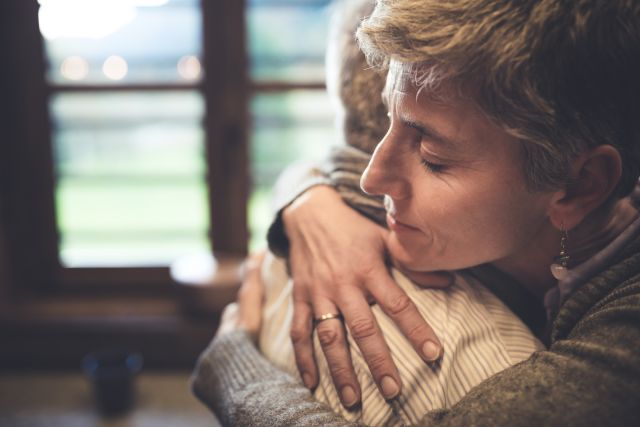Updated on January 18, 2024.
Being a caregiver means you provide consistent and often everyday care to a parent, partner, child, other relative, or unrelated person who is aging, ill, or disabled. It’s a responsibility that can become all-consuming and emotionally challenging, to say the least. In addition to stressful hospital stays, office visits, and a wide range of home-care responsibilities, caregiving often brings:
- Changes to family dynamics
- Time away from work and friends
- Confusion about your identity as you take on the role
Although you may be providing care to someone in addition to holding down a regular job, caregiving itself is hard work. Given the demands, many caregivers experience caregiver burnout and compassion fatigue.
Defining burnout and compassion fatigue
Burnout refers to feelings of emotional and physical exhaustion from the hard work of caregiving. Compassion fatigue is a specific kind of burnout. It happens when caregivers are routinely exposed to the pain, trauma, and suffering of others—and they become overwhelmed by that experience.
In some cases, caregivers may take on that suffering and experience it themselves. In other cases, they may eventually lose the ability to feel sympathy and empathy for others and find it more difficult to act with compassion. Caregivers experiencing compassion fatigue may become detached and socially isolated.
It’s easy to feel alone when you are a caregiver. But the truth is that there are an estimated 53 million unpaid caregivers in the United States, according to a 2020 report from the American Association of Retired Persons (AARP) and the National Alliance for Caregiving. Connecting with those facing similar issues is one important way to tackle caregiver burnout and compassion fatigue.
Here are some common signs of caregiver burnout and compassion fatigue to look out for—plus ways to ease stress and find support.
You’re neglecting your own health
The majority of caregivers in the U.S. are balancing their jobs, parenting their children, and caring for their own aging parents. With so many people depending on you, your own needs often get pushed to the bottom of the list.
“The caregiving role can be so time-consuming,” says Richard Herold, MD, an internal medicine doctor specializing in geriatric medicine at St. Mark's Senior Health Center in Salt Lake City, Utah. In fact, as many as 66 percent of caregivers report having skipped their own healthcare appointments because of time constraints.
Putting off their own health needs—along with the stress of caregiving—contributes to caregivers having almost twice the rate of chronic illnesses like heart disease and diabetes, compared with the general population.
Remember: Caring for yourself is not wasteful or selfish. You can’t help others if you become ill yourself. Try to fit at least some self-care into your day:
- Schedule daily breaks. Write them into your calendar or set alerts on your phone to make sure they happen.
- Choose a quiet spot in your or your loved one’s home and make it your sanctuary. Go to this quiet place and read, journal, or listen to music, even for 5 minutes at a time.
- Take a walk around the block. Even a short stroll can help relax stressed muscles. A breath of fresh air can help reduce feelings of fatigue.
- Practice mindfulness. That may mean starting or ending your day with a brief session of meditation. You may also try incorporating lovingkindness meditation into your practice, which may help you identify and reckon with some of the difficult emotions you may experience as a caregiver.
- Prioritize sleep. It can be hard to turn off your responsibilities at the end of a long day, and in many cases, caregiving duties run well into the night. As much as possible, try to preserve seven to nine hours of quality sleep by creating the best possible environment for rest.
Can’t leave your loved one alone? Consider respite care. With respite care, a trained professional will stay with your loved one while you tend to your own needs, visit your own healthcare provider (HCP), or simply get some needed rest. Find respite care through your local Area Agency on Aging or the National Respite Network.
Your body is exhausted—and hurting
The “fatigue” part of compassion fatigue can become profound, leading to deep physical and emotional exhaustion. It can become difficult to think, feel, and function effectively. Stress can also lead to a range of physical symptoms, including headaches, nausea, and chronic pain.
Meanwhile, the physical toll of caregiving can be significant. Lifting your loved one every day can raise the risk of injuries to your back and joints. In fact, one in five caregivers experience severe physical strain as a result of their responsibilities. Small injuries can add up, causing pain, emotional distress, or the inability to care for others.
You can help prevent injuries with these tips:
- Follow rules and recommendations on safe lifting for caregivers, such as those provided by the American Academy of Orthopaedic Surgeons. You can also ask your loved one’s HCP or physical therapist to show you proper lifting technique.
- If your loved one uses a wheelchair, invest in a portable ramp. Your insurer may reimburse you for a ramp if you get a prescription.
- Prioritize your own physical fitness. This may sound easier said than done, but with just a few minutes each day, you can fit in simple and effective strength exercises.
You've lost contact with other people
Caregiving can be incredibly lonely. You may have less time to connect or maybe you’ve cut yourself off from others because you don’t think anyone could understand what you’re going through. Some caregivers find it hard to share because it can feel stressful discussing what you go through each day. You may also feel guilty talking about how difficult the person or situation is.
In fact, this is actually one of the most important times to share your feelings.
“Most conditions like Alzheimer’s or heart disease have support groups available through national organizations, such as the Alzheimer’s Association or the American Heart Association,” says Dr. Herold. “Also, many hospitals have local support groups.” (See more on support groups below.)
It’s also important to try to maintain your connection to friends and other family members. Even if you can’t meet for lunch or coffee, try to schedule regular phone or video calls to stay in touch.
You’re not eating well
Chronic stress, long hospital stays, and cooking for others first can lead to irregular eating habits of your own. It often feels easy to grab the quickest meal option—whether fast food, energy bars, or packaged snacks—when you are strapped for time. But to avoid caregiver burnout, it’s important to plan ahead and start building your own dietary needs into your daily routine:
- Find out if the person you’re caring for qualifies for Meals on Wheels. This can help free up time and money for healthy meal prep. Even if you get help with just a few meals a week, you can put that saved money toward buying fresh fruits and veggies and creating a few healthy meals.
- Grocery shopping and meal prep are tasks that friends, family, and loved ones can handle for you. When people ask how they can help, be willing to accept the assistance, and be specific with what they can buy and cook for you.
- As much as possible, prioritize healthy eating for yourself. It’s worth the extra effort and investment to eat meals and snacks made with fresh fruits and vegetables, whole grains, and lean proteins. The energy you get from healthful eating can help sustain your stamina.
You feel helpless, hopeless, and overwhelmed
At least 20 percent of family caregivers experience depression, according to the Family Caregiver Alliance, and that figure is higher depending on your loved one’s condition. For example, as many as 40 percent of caregivers of people with dementia experience depression. All told, between 40 and 70 percent of family caregivers have depression symptoms that are considered clinically significant.
Research also suggests that rates of post-traumatic stress disorder (PTSD) among caregivers may be upwards of 25 percent or higher. It’s common to struggle as you cope with:
- Seeing physical or mental changes in your loved one
- Taking on a parenting role toward your own parent or spouse
- Coming to terms with your new identity as a caregiver
In addition to raising one’s risk of anxiety and depression, compassion fatigue may bring other emotional challenges. You may begin to feel cynical, apathetic, or even hardened or unsympathetic toward the suffering of others. People with compassion fatigue may also develop addictive behaviors (including smoking, alcohol, drugs, and gambling) or eating disorders.
That’s why it’s so important to reach out for help if you feel you need it. Doing so may include these steps:
- Seek out a caregiver support group in your area, such as those through the Family Caregiver Alliance.
- Call a caregiver support hotline, such as those offered by the Caregiver Action Network or the AARP.
- Speak to your HCP about getting help. They may refer to you a mental health professional, such as a psychologist or counselor. A therapist can help you handle negative thoughts so you can take the best possible care of your loved one and yourself.
If you are experiencing a mental health crisis, call the 988 Suicide & Crisis Lifeline for free, confidential support any time of day.
Remember, caregiving isn’t a sprint, it’s a marathon. As much as possible, it’s important to plan, pace yourself, and take breaks along the way. And give yourself credit even when the road gets a little rough. This isn’t an easy job, but you’re showing up and doing the best you can every day.







